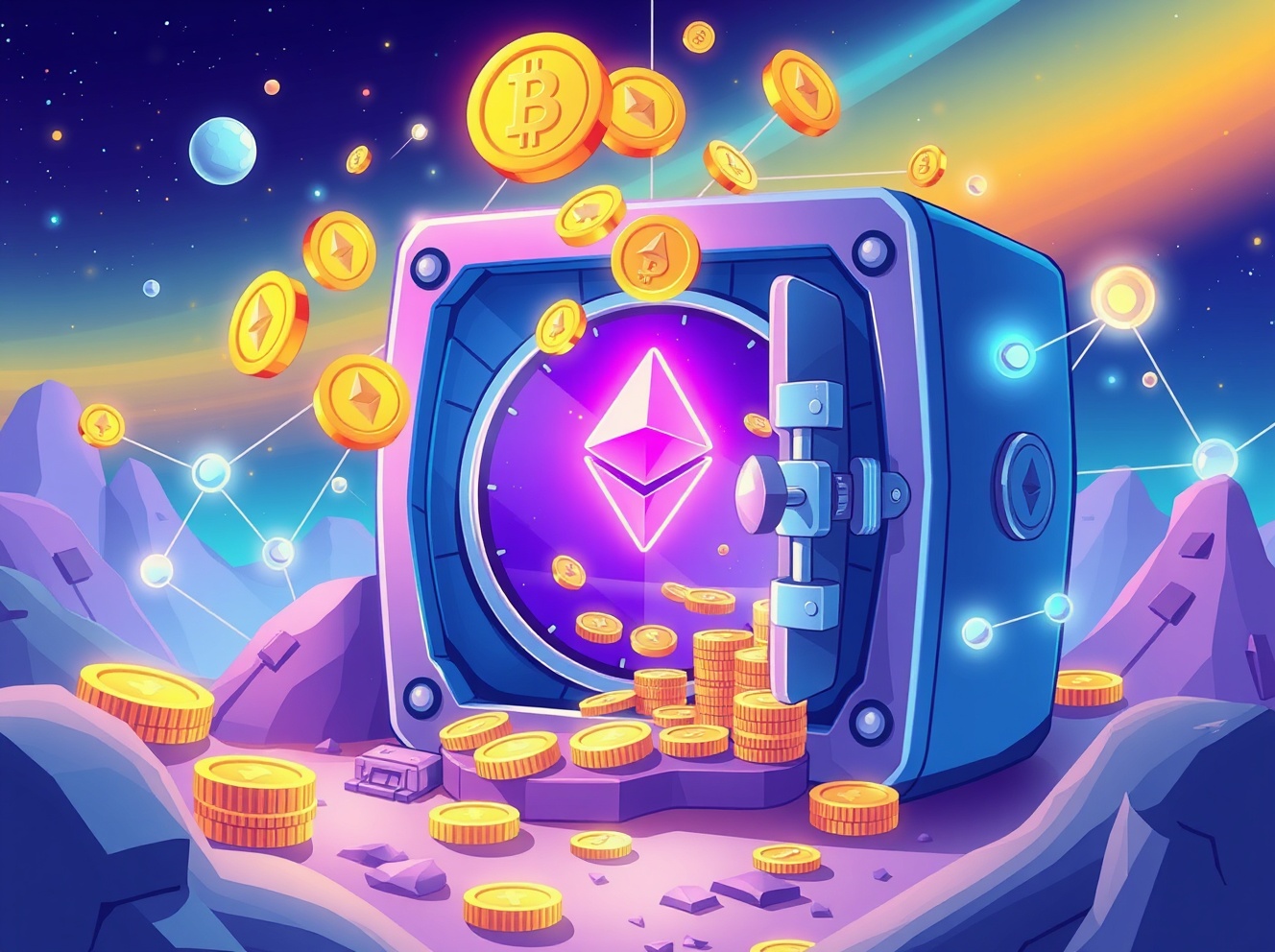Revolutionary Asset Tokenization: PDAX’s $60 Billion Plan to Transform Philippine Finance
Поделиться:

BitcoinWorld

Revolutionary Asset Tokenization: PDAX’s $60 Billion Plan to Transform Philippine Finance
Imagine turning traditional financial assets like stocks and bonds into digital tokens on a blockchain. That’s exactly what Philippine cryptocurrency exchange PDAX is planning to achieve with its ambitious Project Bayani initiative. The exchange aims to revolutionize the country’s financial landscape by tokenizing $60 billion worth of assets by 2030, marking one of the most significant asset tokenization projects in Southeast Asia.
What Exactly is Asset Tokenization and Why Does It Matter?
Asset tokenization converts physical or traditional financial assets into digital tokens on a blockchain. Think of it as creating digital versions of real-world assets that you can trade, transfer, and manage with unprecedented efficiency. This revolutionary approach to asset tokenization eliminates many traditional barriers in finance, making investments more accessible to ordinary Filipinos.
The targeted assets for this massive asset tokenization project include:
- Publicly offered shares of companies
- Government bonds and securities
- Mutual funds and investment vehicles
- Other traditional financial instruments
How Will Project Bayani Transform Philippine Finance?
Project Bayani represents a fundamental shift in how Filipinos interact with financial markets. Traditional investment methods often exclude many potential investors due to high barriers to entry. However, through strategic asset tokenization, PDAX aims to democratize access to wealth-building opportunities.
The benefits of this comprehensive asset tokenization initiative are substantial:
- Increased liquidity for traditionally illiquid assets
- Lower transaction costs compared to traditional methods
- 24/7 market access without traditional trading hours
- Fractional ownership of high-value assets
- Enhanced transparency through blockchain technology
What Challenges Does This Ambitious Plan Face?
While the potential of this massive asset tokenization project is enormous, several challenges need addressing. Regulatory frameworks must evolve to accommodate digital assets properly. Moreover, educating both investors and traditional financial institutions about blockchain technology remains crucial for widespread adoption.
The Philippine government’s cooperation will be essential for success. Fortunately, recent developments suggest growing acceptance of digital assets in the country’s financial ecosystem. This progressive approach to asset tokenization could position the Philippines as a regional leader in financial innovation.
What Does This Mean for the Average Filipino Investor?
For ordinary Filipinos, this ambitious asset tokenization project opens doors previously closed to many. Imagine being able to invest small amounts in government bonds or blue-chip stocks that were previously inaccessible due to high minimum investment requirements. This democratization of finance could significantly impact wealth distribution and economic participation.
The timeline extending to 2030 allows for careful implementation and regulatory adaptation. However, the foundation being laid today through Project Bayani’s asset tokenization framework promises to reshape the Philippine financial landscape for generations to come.
Conclusion: A Financial Revolution in the Making
PDAX’s $60 billion asset tokenization plan represents more than just a technological upgrade—it’s a fundamental reimagining of financial accessibility in the Philippines. By bridging traditional finance with blockchain innovation, Project Bayani could unlock unprecedented economic opportunities for millions of Filipinos while positioning the country at the forefront of financial technology in Southeast Asia.
Frequently Asked Questions
What is asset tokenization?
Asset tokenization is the process of converting rights to a physical or financial asset into a digital token on a blockchain, making it easier to trade, transfer, and manage.
When will PDAX complete this tokenization project?
PDAX aims to tokenize $60 billion in assets by 2030 through its Project Bayani initiative, providing an eight-year timeline for implementation.
What types of assets will be tokenized?
The project targets publicly offered shares, government bonds, mutual funds, and other traditional financial instruments for tokenization.
How will tokenization benefit ordinary investors?
Tokenization enables fractional ownership, lower investment minimums, increased liquidity, and 24/7 market access, making investments more accessible.
Is asset tokenization legal in the Philippines?
While regulatory frameworks are evolving, the Philippine government has shown increasing acceptance of digital assets and blockchain technology.
What makes PDAX qualified for this project?
PDAX is a licensed cryptocurrency exchange in the Philippines with experience in digital asset trading and blockchain technology implementation.
Found this insight into the future of Philippine finance exciting? Share this article with friends and colleagues who would benefit from understanding how asset tokenization is transforming investment opportunities in Southeast Asia. Help spread awareness about this financial revolution by posting on your social media channels!
To learn more about the latest cryptocurrency trends, explore our article on key developments shaping blockchain technology and institutional adoption.
This post Revolutionary Asset Tokenization: PDAX’s $60 Billion Plan to Transform Philippine Finance first appeared on BitcoinWorld.
Revolutionary Asset Tokenization: PDAX’s $60 Billion Plan to Transform Philippine Finance
Поделиться:

BitcoinWorld

Revolutionary Asset Tokenization: PDAX’s $60 Billion Plan to Transform Philippine Finance
Imagine turning traditional financial assets like stocks and bonds into digital tokens on a blockchain. That’s exactly what Philippine cryptocurrency exchange PDAX is planning to achieve with its ambitious Project Bayani initiative. The exchange aims to revolutionize the country’s financial landscape by tokenizing $60 billion worth of assets by 2030, marking one of the most significant asset tokenization projects in Southeast Asia.
What Exactly is Asset Tokenization and Why Does It Matter?
Asset tokenization converts physical or traditional financial assets into digital tokens on a blockchain. Think of it as creating digital versions of real-world assets that you can trade, transfer, and manage with unprecedented efficiency. This revolutionary approach to asset tokenization eliminates many traditional barriers in finance, making investments more accessible to ordinary Filipinos.
The targeted assets for this massive asset tokenization project include:
- Publicly offered shares of companies
- Government bonds and securities
- Mutual funds and investment vehicles
- Other traditional financial instruments
How Will Project Bayani Transform Philippine Finance?
Project Bayani represents a fundamental shift in how Filipinos interact with financial markets. Traditional investment methods often exclude many potential investors due to high barriers to entry. However, through strategic asset tokenization, PDAX aims to democratize access to wealth-building opportunities.
The benefits of this comprehensive asset tokenization initiative are substantial:
- Increased liquidity for traditionally illiquid assets
- Lower transaction costs compared to traditional methods
- 24/7 market access without traditional trading hours
- Fractional ownership of high-value assets
- Enhanced transparency through blockchain technology
What Challenges Does This Ambitious Plan Face?
While the potential of this massive asset tokenization project is enormous, several challenges need addressing. Regulatory frameworks must evolve to accommodate digital assets properly. Moreover, educating both investors and traditional financial institutions about blockchain technology remains crucial for widespread adoption.
The Philippine government’s cooperation will be essential for success. Fortunately, recent developments suggest growing acceptance of digital assets in the country’s financial ecosystem. This progressive approach to asset tokenization could position the Philippines as a regional leader in financial innovation.
What Does This Mean for the Average Filipino Investor?
For ordinary Filipinos, this ambitious asset tokenization project opens doors previously closed to many. Imagine being able to invest small amounts in government bonds or blue-chip stocks that were previously inaccessible due to high minimum investment requirements. This democratization of finance could significantly impact wealth distribution and economic participation.
The timeline extending to 2030 allows for careful implementation and regulatory adaptation. However, the foundation being laid today through Project Bayani’s asset tokenization framework promises to reshape the Philippine financial landscape for generations to come.
Conclusion: A Financial Revolution in the Making
PDAX’s $60 billion asset tokenization plan represents more than just a technological upgrade—it’s a fundamental reimagining of financial accessibility in the Philippines. By bridging traditional finance with blockchain innovation, Project Bayani could unlock unprecedented economic opportunities for millions of Filipinos while positioning the country at the forefront of financial technology in Southeast Asia.
Frequently Asked Questions
What is asset tokenization?
Asset tokenization is the process of converting rights to a physical or financial asset into a digital token on a blockchain, making it easier to trade, transfer, and manage.
When will PDAX complete this tokenization project?
PDAX aims to tokenize $60 billion in assets by 2030 through its Project Bayani initiative, providing an eight-year timeline for implementation.
What types of assets will be tokenized?
The project targets publicly offered shares, government bonds, mutual funds, and other traditional financial instruments for tokenization.
How will tokenization benefit ordinary investors?
Tokenization enables fractional ownership, lower investment minimums, increased liquidity, and 24/7 market access, making investments more accessible.
Is asset tokenization legal in the Philippines?
While regulatory frameworks are evolving, the Philippine government has shown increasing acceptance of digital assets and blockchain technology.
What makes PDAX qualified for this project?
PDAX is a licensed cryptocurrency exchange in the Philippines with experience in digital asset trading and blockchain technology implementation.
Found this insight into the future of Philippine finance exciting? Share this article with friends and colleagues who would benefit from understanding how asset tokenization is transforming investment opportunities in Southeast Asia. Help spread awareness about this financial revolution by posting on your social media channels!
To learn more about the latest cryptocurrency trends, explore our article on key developments shaping blockchain technology and institutional adoption.
This post Revolutionary Asset Tokenization: PDAX’s $60 Billion Plan to Transform Philippine Finance first appeared on BitcoinWorld.



